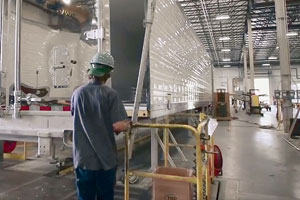Senior Reporter
April Trailer Orders Decrease; Factory Backlogs Still Strong

This story appears in the May 30 print edition of Transport Topics.
U.S. trailer orders slipped in April from a year earlier as purchasers turned a bit more cautious, while manufacturers continued to work off their backlogs, analysts said.
ACT Research Co. reported April orders were down 7% year-over-year to 16,911.
“New orders continued to meander in April, the result of fleet caution about current freight conditions and the extent of the current backlog,” said Frank Maly, director of commercial vehicle analysis and research at ACT.
Maly said that fleet investment plans continue to be relatively stable despite concern over softness in freight volumes and contract and spot rates.
“Given that we are at the tail end of the order season, April was a fairly reasonable month,” he said.
Maly noted there was a bump in cancellations, but “not all cancellations are bad.”
Sometimes fleets adjust their plans, pull orders and reorder for later delivery, he said.
Separately, research firm FTR reported orders dropped 12% to 15,800 units, which was the weakest for any April since 2010.
“The trailer market is slowly moderating and beginning a transition period,” said Don Ake, FTR’s vice president of commercial vehicles.
Ake said cancellations have been at elevated levels the past two months, which is usually an indication the market “will begin cooling soon.”
However, with backlogs in “excellent shape,” he said, no major adjustment to production is expected “for a few months.”
April orders reflected continued demand for dry van and refrigerated trailers along with dump trailers, he added.
“Fleets are profitable, and they are using some of these profits to replace units that were not able to be replaced during the ‘great recession.’ Refrigerated freight is still robust, driving the need for new and replacement units. The dump trailer market is being boosted by increased road construction,” Ake said.
Orders also were up 15% month-over-month, FTR said; ACT put the increase at 12%.
However, Glenn Harney, chief sales officer at Hyundai Translead, said customers are becoming cautious.
“Some of their rates are under pressure, and they are looking to make sure they don’t get ahead of the freight if there is going to be any downturn. It is caution more than anything,” Harney said.
Still, the manufacturer had a “very good” April, Harney said, with quoting and buying assuming a more normal approach compared with recent years.
“Demand is still good,” he said, “but it is more orderly.”
Charles Willmott, chief sales officer at The Strick Group, said ordering had “quieted” while backlogs were “still solid” through 2016. He also said data pointed to a more sustainable industry volume in 2017.
At the same time, he said, supply and demand may eventually become skewed.
“Unfortunately, with the recent capital expansions initiated by several North American trailer OEMs, new trailer supply is apt to be out of balance with industry demand over the next five years,” Willmott said.
Larry Roland, director of marketing at Utility Trailer Manufacturing Co., said low fuel prices and interest rates continue to spur the market heading into the summer months, when orders typically are low.
“However, if we are going to see any true difference between this year and the last two, it will be in the post-summer months, when many carriers make their buying decisions for the following year,” he said.
At Stoughton Trailers, David Giesen, vice president of sales, said backlog remained very healthy and “there is still interest in ordering trailers yet this year. I believe this ‘cooling off’ is just getting us back into normal historical numbers.”
David Gilliland, vice president of national accounts at Great Dane Trailers, said April, like past months, reflected orders placed earlier than normal due to long lead times.
At the same time, “There are a group of carriers that have not made their 2016 buying decision as yet, so there could be a jump in orders over the next two months,” Gilliland said.
Dick Giromini, CEO of Wabash National Corp., said he expected to see an order pattern similar to last year’s as trailer manufacturers begin accepting calendar year 2017 orders in the second half of the year.
“In fact, quote demand for van trailers was such that build requests for calendar year 2016 slots far exceeded our capacity, leading to requests from customers to consider opening calendar year 2017 build slots early. So it is not surprising to see that order levels have remained somewhat softer than what would normally be expected for the first few months of the current year.”

